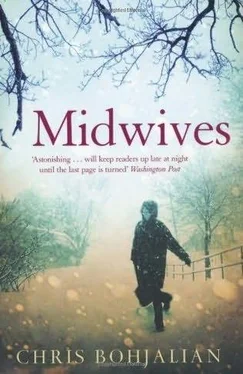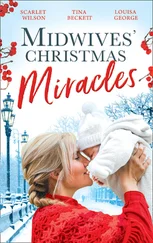Chris Bohjalian - Midwives
Здесь есть возможность читать онлайн «Chris Bohjalian - Midwives» весь текст электронной книги совершенно бесплатно (целиком полную версию без сокращений). В некоторых случаях можно слушать аудио, скачать через торрент в формате fb2 и присутствует краткое содержание. Жанр: Современная проза, на английском языке. Описание произведения, (предисловие) а так же отзывы посетителей доступны на портале библиотеки ЛибКат.
- Название:Midwives
- Автор:
- Жанр:
- Год:неизвестен
- ISBN:нет данных
- Рейтинг книги:5 / 5. Голосов: 1
-
Избранное:Добавить в избранное
- Отзывы:
-
Ваша оценка:
- 100
- 1
- 2
- 3
- 4
- 5
Midwives: краткое содержание, описание и аннотация
Предлагаем к чтению аннотацию, описание, краткое содержание или предисловие (зависит от того, что написал сам автор книги «Midwives»). Если вы не нашли необходимую информацию о книге — напишите в комментариях, мы постараемся отыскать её.
Midwives — читать онлайн бесплатно полную книгу (весь текст) целиком
Ниже представлен текст книги, разбитый по страницам. Система сохранения места последней прочитанной страницы, позволяет с удобством читать онлайн бесплатно книгу «Midwives», без необходимости каждый раз заново искать на чём Вы остановились. Поставьте закладку, и сможете в любой момент перейти на страницу, на которой закончили чтение.
Интервал:
Закладка:
"That's how it's always been with midwives," he said with dignified authority, pacing calmly before the jurors. "To some people, they're witches-or, these days, strange and somehow dangerous throwbacks to another era. But in the eyes of other people, they're healers. Not surprisingly, it always seems to be the women who see them as healers, and the men who are quick to cry witch. Or shaman. Or meddler. Midwives, by their very nature and profession, have always challenged authority; they've always been a bit too independent-in the eyes of men, anyway. The history of midwifery in America is filled with the names of women lionized by their own gender and ostracized by men. Names like Anne Hutchinson. That's right, Anne Hutchinson. The first religious leader in Colonial America who was a woman was also a midwife.
"In addition to having a brilliant mind, Anne Hutchinson had the strong heart and gentle hands of a midwife. And she had followers. So what happened to Anne? The men-the men-of Massachusetts banished her to the rough woods that with her help would become the fine state of Rhode Island.
"Did they ask the mothers how they felt about this? No. Of course they didn't," Stephen continued, and he shook his head and smiled at the jurors, offering them a grin that said, I'm not surprised, are you?
I followed his gaze to the group, hoping to see that they were as disgusted as he. I couldn't tell. Vermonters would make good poker players if they ever decided to give up military whist, and this particular batch of farmers and florists, schoolteachers and chimney sweeps, loggers and secretaries and journeyman carpenters was not atypical: They sat unmoving, many with their hands in their laps, their faces almost uniformly reserved, businesslike, and indecipherable.
There were seven women and five men on the jury. Both alternates were women, and so the box looked deceptively female. No one in the group had ever tried to have a baby at home, although I knew two of the three older women on the jury had themselves been born there. There were no doctors or nurses in the box, as Stephen desired, but obviously there were no midwives either, or people who were even related to midwives.
One man knew one midwife, but not very well, and another fellow-the part-time chimney sweep and part-time roofer-scraped the creosote regularly from the chimneys in one midwife's house. But he couldn't recall the two of them ever discussing birth while he was there.
Nobody on the jury worked at food co-ops or frequented natural-food grocery stores. Nobody said they had ever lived on communes.
There was one woman of childbearing age on the jury, the principal demographic Stephen was hoping to avoid. She was a woman in her late twenties with stylish red hair and the sort of makeup one usually saw in Vermont only on tourists visiting from New York City. She was a mother with children three and six years old, and plans to have more. She worked as a secretary at a ski resort, but none of us thought she did it for the money. Moreover, her grandfather had been a physician, and so she worried Stephen as much as anyone on the jury. She was smart, articulate, and properly-or improperly-inspired, she was the sort who could dominate deliberations.
Unfortunately, there had been panelists far worse from our perspective, and so she had stayed.
Stephen held up Priscilla Mayhew's diary for the group again, a hardcover book with a glossy dust jacket. There was a painting of a wooden birthing stool on the front, which was a source of endless frustration for my mother. Apparently it was highly unlikely Priscilla Mayhew had ever used such a thing, and a careful reading of the diary made that clear.
"Now, by the standards of late-twentieth-century America, was Mrs. Mayhew's maternal mortality rate high?" Stephen asked the jury rhetorically.
"Yes. By our standards it was. By our standards it was unacceptably high. Mrs. Mayhew witnessed one maternal death for every one hundred and ninety-two happy, healthy babies she delivered. Roughly two hundred years later, in 1981, barely one in ten thousand mothers dies while giving birth. And yet as recently as 1930, as recently as fifty years ago, in the United States one woman in one hundred and fifty died as a result of childbirth. One out of one hundred and fifty. You can look it up at the National Center for Health Statistics. Is there an irony here? You bet.
"In the United States in 1930, most of those women were laboring in hospitals, and they were laboring in the care of physicians.
"In other words, Priscilla Mayhew, eighteenth-century midwife, had a dramatically lower mortality rate than physicians practicing as recently as 1930.
"And while obstetrics has made impressive leaps in the last fifty years, the statistics show that today a planned home birth is every bit as safe as a hospital one-for babies as well as for mothers," Stephen said, striding toward the table where my mother and Peter were sitting. Peter handed him a piece of paper with columns of figures.
"The numbers in this research may surprise you, but here they are. In a recent study, one-point-three babies died out of every one thousand born at home, while one-point-seven died out of every one thousand born in some Minnesota hospitals… or two-point-four in one particular New York State hospital.
"My point? The people who are prosecuting Mrs. Danforth are going to be insisting that home birth is not merely irresponsible, it's insane. Well, you're going to see that they're wrong. It may not be the right choice for some women, but it's no more dangerous for most than a hospital birth. Let's face it, women have been having babies in their homes since, well, since the beginning of time. And until recently, they were cared for by the likes of Priscilla Mayhew: knowledgeable, tireless, loving midwives. Women who dedicated their lives to their sisters in labor. Who were these women?
"There's one sitting right before you. Sibyl Danforth. As you know, Sibyl Danforth is a midwife. You will learn that she is a knowledgeable midwife. A tireless midwife. A loving midwife.
"Most important, you will learn that she is an excellent midwife.
"You will learn that statistically her babies did every bit as well as babies born at North Country Hospital, and her mothers actually did better. That's right, her mothers did better. They had fewer episiotomies, fewer lacerations, and fewer surgical interventions," he said, meaning cesarean sections. He had explained to my family that he was going to use euphemisms wherever possible in the beginning-words like lacerations, for example, instead of perineal tears-and he was going to avoid the word cesarean at all costs. That word, and all it connoted, would become a fixture in the trial soon enough, he had said.
"In all of her years of delivering babies and tending to mothers, only one woman died. Charlotte Bedford.
"And please understand, we are not going to tell you that her death isn't a tragedy. It is, my God, of course it is," Stephen said, and he ran his hand over the lacquered wood at the edge of the court reporter's desk. Almost all of the wood in the courtroom was so sleek that it shined, especially the dark amber posts that bordered the doors like Doric columns.
"And no one is sadder about that fact than Sibyl Danforth. Is Charlotte Bedford's family devastated by the loss? Yes. Any family would be. But Sibyl Danforth is devastated, too. After all, Sibyl Danforth saw her die. She was there, she was present in the room. She saw the woman die.
"But Sibyl Danforth did not kill her, and that is what this case is all about," he said, and he paused. For a long moment he stood perfectly still before the jury box in his banker's gray, one-click-above business suit, unmoving. His back was absolutely straight, his hands were at his sides, and for the first time that day I was reminded that Stephen was a war veteran.
Читать дальшеИнтервал:
Закладка:
Похожие книги на «Midwives»
Представляем Вашему вниманию похожие книги на «Midwives» списком для выбора. Мы отобрали схожую по названию и смыслу литературу в надежде предоставить читателям больше вариантов отыскать новые, интересные, ещё непрочитанные произведения.
Обсуждение, отзывы о книге «Midwives» и просто собственные мнения читателей. Оставьте ваши комментарии, напишите, что Вы думаете о произведении, его смысле или главных героях. Укажите что конкретно понравилось, а что нет, и почему Вы так считаете.











